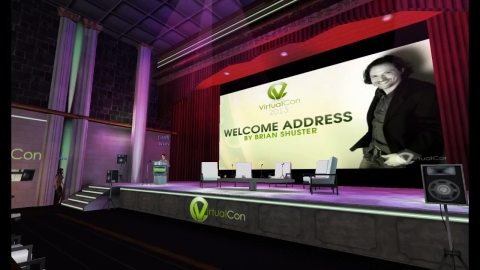Virtual Trade Shows – Two Successes with Two Different Approaches

Bring up the words “virtual trade show” around many in our industry and eyes start to roll. You’re even likely to get the cold shoulder here and there. At least one person will emphatically state, “virtual shows will never replace face-to-face events.”
But two organizations have embraced virtual trade shows, while taking two very different approaches.
The International Wireless Communications Expo (IWCE) uses their virtual trade show as a marketing tool for their real world event. The virtual show, held almost four months prior to their real world show, gives attendees a preview of their live event.
Stacey Orlick, event and content director for IWCE and Urgent Communications, said that their virtual tradeshow "gives people a taste of wha tthey would get at the live event.”
Stephanie McCall, brand director for IWCE and IWCE Urgent Communications, added, “We wanted to keep the conversations going more than one event a year.”
Utherverse, a company that creates 3-D virtual environments for live entertainment, online dating, charitable events, business opportunities and education; created a virtual-only B2B trade show for the virtual world industry.
Virtual Con also is celebrating their third show this year, which was held this past August with more than 3,000 attendees. Brian Shuster, CEO of Utherverse, said that Virtual Con came about when he discovered a trade show for the virtual world industry.
Shuster reflected back to that discovery when he thought, “This is interesting, this is a virtual world trade show. We’ll just pop online and go, but we had to fly to New York to go.” Shuster saw no reason he could not replicate that experience online.
Both shows say their feedback from exhibitors is positive and that business is being done on the virtual trade show floor.
Orlick said what they heard from exhibitors was that they made contact in the virtual trade show and that contact either led to a sale, or an actual meeting at the live event.
“Unquestionably the sponsors always come back to us and say the actual sales they do exceeded expectations. We get the same sponsors and new sponsors and continue to increase revenue each year,” Shuster said.
One very big difference with real word shows and virtual world shows is the exhibitor timeline.
McCall said, “That’s the beauty of the virtual event. People can sign on to participate up to a week to 10 days before the event. (In past years), we have signed up an exhibitor three to four days before the event.”
Shuster also commented on the flexibility advantages of the virtual trade show. “One of the key differences is, for a virtual convention we are able to adapt at the last minute. We can add another hall to the convention center.”
Imagine for a minute a show that never sells out of exhibit space simply because there is an unlimited supply of space.
One of the aspects of the IWCE show that attendees liked was the ability to go to one place online to get all the exhibitors' information rather than doing a Google search on each different company.
They also found a virtual event to be less intrusive than the real world component.
Attendees can wander into a booth and choose whether or not they want to interact with the booth staff via a chat function.
One popular aspect of Virtual Con is its job fair. Shuster reported that approximately 100 jobs were filled during Virtual Con this past August.
With attendee and exhibitor budgets - both those for time and money - still being tight, virtual trade shows may be something that deserves a closer look.
McCall’s advice to other shows is, “Don’t be afraid to take the plunge. Most people get into the mindset that we can only do the live event. In this digital age don’t be afraid to experiment because you never know.”
Orlick added, “It is such a different experience. Use it to your advantage, use it to preview your show, use it for a post event.”


Add new comment